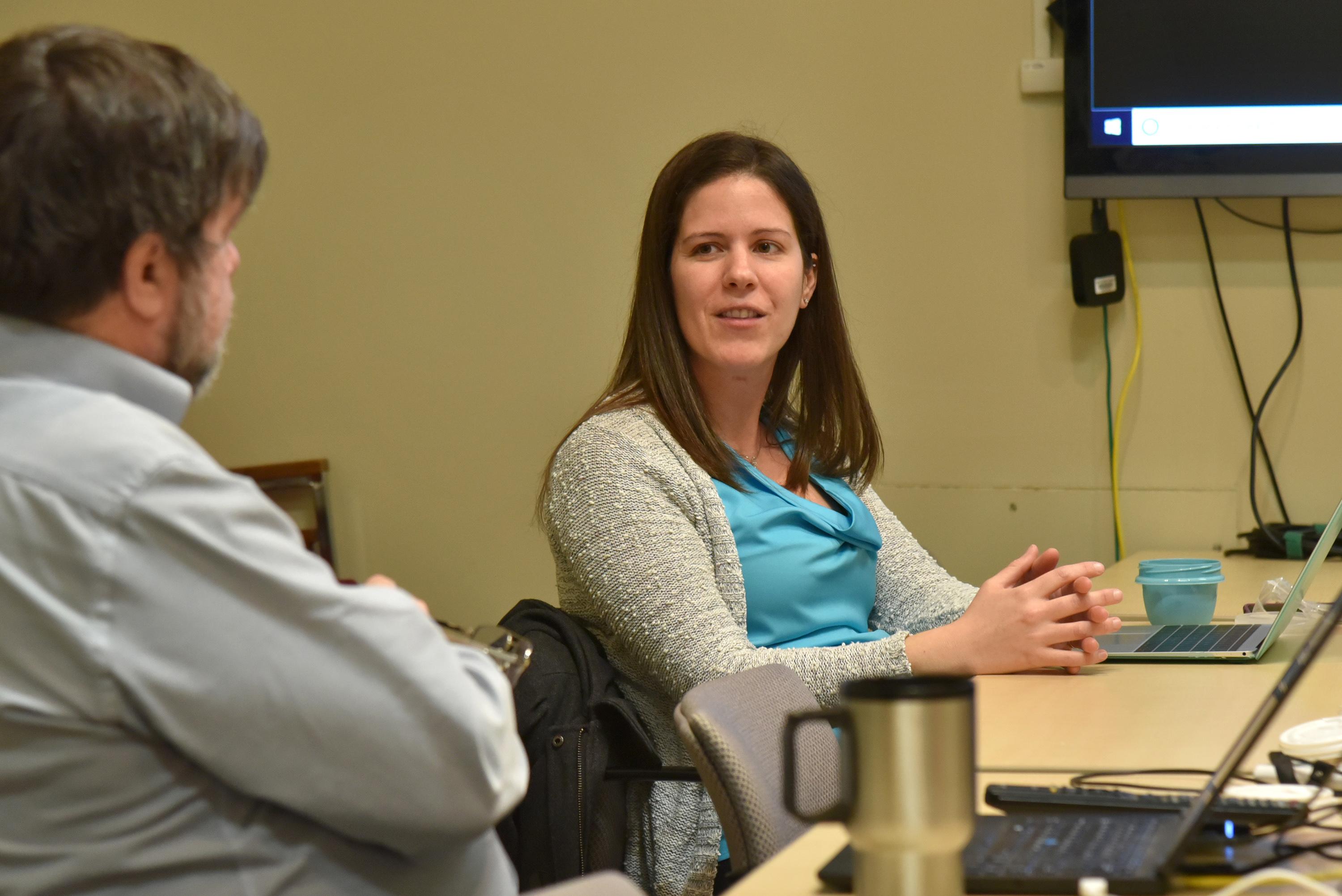Growth opportunity -- SUNY Oswego faculty fellow Elizabeth Keida of the School of Education's health promotion and wellness program takes part in a follow-up discussion recently about teaching techniques she and 34 other faculty members have tried as a result of an intensive, student-success-centered professional development course.
SUNY Oswego has named 35 of its faculty as fellows to engage in a yearlong series of intensive training modules called the "Course in Effective Teaching Practices," with a goal of increasing student success.
The Association for College and University Educators (ACUE), a company founded in 2014 by leaders in higher education, guides the cross-campus, broadly representative group of faculty in 25 training modules. The program is endorsed by and in collaboration with the major coordinating body for the nation's colleges and universities, the American Council on Education.
Scott Furlong, SUNY Oswego's provost and vice president of academic affairs, saw demonstrations of the training at conferences, and noted that ACUE's instructors are themselves faculty at respected schools.
"ACUE promoted their program very much around students spending a vast amount of time with professors in the classroom," Furlong said. "This is professional development for our instructors, to really have them engage with their colleagues around teaching. It is a full-blown program with certification.
"More generally, the program fits perfectly with SUNY Oswego's continued efforts to promote student success. The more our faculty seek to enhance their teaching, the better our students are served."
John Kane, who for years has directed the college's own professional development arm, the Center for Excellence in Learning and Teaching (CELT), welcomed the ACUE program, which he says "closes the loop" on other skills-building efforts for faculty at SUNY Oswego: To earn each of 25 badges and ultimately achieve certification, the fellows need to implement in their classrooms at least one of the evidence-based teaching practices -- there are more than 200 in all -- per weekly training module. They also must reflect deeply outside of class and discuss their experiences with the faculty learning community. An outside grader reviews and scores their work.
"The way many professors teach is the way they were taught in the past," said Kane, who facilitates the program with Rebecca Mushtare, associate director of CELT. "All of these teaching techniques have been shown to increase student learning."
Critical thinking
For example, a set of techniques known as "advanced questioning" features video of accomplished educators prompting students with pre-planned questions that help students make connections to other things in their lives. Professors from Kansas State University, the University of Connecticut and Florida A&M University appear in videos demonstrating the techniques, which are designed to improve students' own critical thinking and questioning.
There are stage-setting presentations, such as designing an effective course, establishing specific actionable learning outcomes and promoting a civil classroom environment. Topics in other modules include active learning techniques in both small groups and large classes, promoting higher-order thinking through teaching powerful note-taking skills, providing clear directions and explanations, developing fair and transparent grading practices, and much more.
ACUE says over 30 years' worth of research in cognition and adult learning has proven that effective teaching improves learning for all students. Kane agrees.
Our student body is increasingly diverse, and many are first-generation college students," he said. "We need to have a faculty that's prepared to provide them with the education they need and deserve."
Teaching fellows Elizabeth Dunne Schmitt of economics, Eric Hellquist of biological sciences and Elizabeth Keida of the School of Education's health promotion and wellness program attended a recent training follow-up discussion in CELT's office in Penfield Library. Other fellows -- including Mamta Saxena of human development, Mark Springston of technology and Michael Quirk, an adjunct instructor in health promotion and wellness -- attended remotely via Zoom video conferencing. Kane, an economics professor, coordinated the session.
Active classrooms
Schmitt said that following an early ACUE class, she surveyed a large class of students with the question, "What's the best -- and worst -- class you ever had, and why?" Results supported the ACUE model. Students want to be engaged and active in class, she said, and not merely take notes as a professor reads from Powerpoint slides.
"In my 23 years, it would be easy to say I know how to do this and go on auto-pilot," she said as she reported about ACUE methods she has tried. "You have to implement these teaching practices. It forces you to look at ways to improve."
Keida said she has looked for opportunities to learn more about pedagogy -- methods and practices in teaching -- in her seven years here, and is delighted to have been chosen a fellow for the "Effective Teaching Practices" certificate program.
"This is my chance," she said. "This is exactly what I want."
The teaching fellows will work through the ACUE program all through the spring and fall semesters. Those who earn their ACUE Certificate in Effective College Instruction will attend a pinning ceremony early in 2020, CELT's Mushtare said.
"These fellows are demonstrating commitment to improved teaching," she said. "CELT is excited for them to share their experiences, and perhaps get more teachers to apply in the future."
Through ACUE’s Community of Professional Practice, certificate holders receive "ongoing support to refine their teaching, stay current on research and advance the national conversation," the company says.




